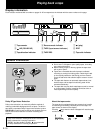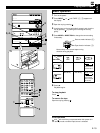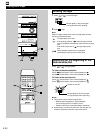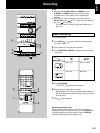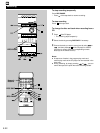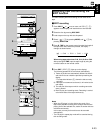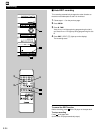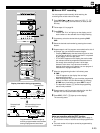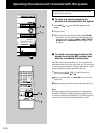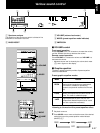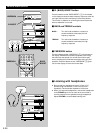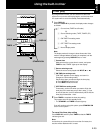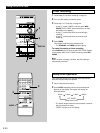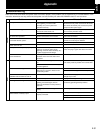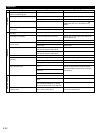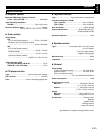
E-26
DISC
1
DISC
2
DISC
3
DOWN UP
VOLUME
STANDBY/ON
DIRECTION
YMERSION
B.BOOST
MUSIC
INPUTINPUT
MIN
PRESET
/
TUNING
/
BAND A
/
B
/
C
/
D
/
E
DISC CHANGE OPEN
/
CLOSE
AUTO/MANUAL
TIMER
MEMORY
TIME ADJ
REC/PAUSEDOLBY NR
HOUR
RANDOM
REPEAT TIME
DISPLAYMODE
1
1
2
2
3
3
4
4
5
5
6
6
7
7
8
8
9 0
TIME PROG R. TIME
C
EDIT
D
PRESET
+
I0
E
MODE REPEAT
RANDOM
TUNER
DISC SKIP
REC/PAUSE
DIRECTION
YMERSION
BASS BOOST
MUSIC
POWER SLEEP
INPUT
VOLUME
AB
TAPE
TUNER
CD
/
I
Ⅵ To listen to a source played on the
external unit connected with this system
1 Press INPUT or until “AUX/MD” appears on the
display.
2 Play the source.
3 Adjust the volume to the desired level by using VOLUME.
* If you prefer, you can control the sound quality by using
the built-in graphic equalizer (MUSIC), BASS, TREBLE,
B. BOOST and/or YMERSION. (Refer to pages 27–28
for details.)
Operating the external unit connected with this system
1, 11
3, 22
1, 11
3, 22
Use the external unit connected to the AUX/MD terminals
on the rear of the main unit.
Ⅵ To record a source played back on this
system by using the MD recorder, tape
deck etc. connected to this system
If an MD recorder, tape deck (DAT), etc. is connected to the
AUX/MD terminals on the rear of the main unit, you can record
a source played on the built-in CD player, tape deck or a radio
program by the MD recorder, tape deck (DAT), etc.
11 Select the source (CD, TAPE or TUNER) you want to
record by using INPUT
or .
22 Play the source and then turn VOLUME up to confirm the
input source.
33 Begin recording on the MD recorder, tape deck (DAT), etc.
Note
A digital-to-digital recording is possible from a CD played on
the built-in CD player to an MD (or tape) on the MD recorder
(or DAT) by connecting the DIGITAL OUT (OPTICAL) terminal
on the rear of the main unit to the MD recorder (or DAT).



